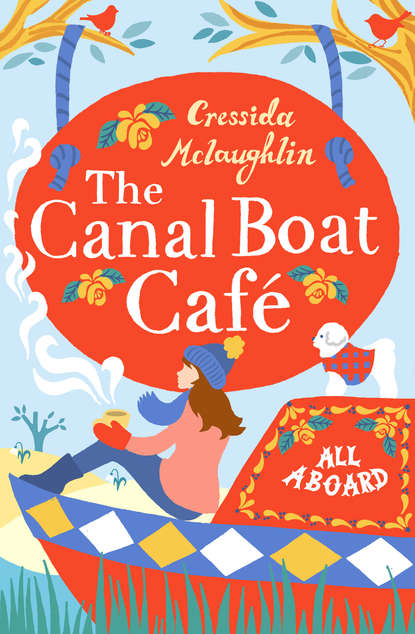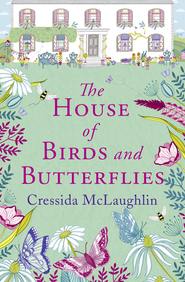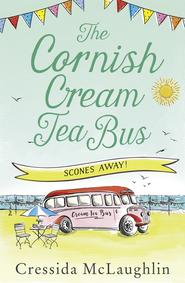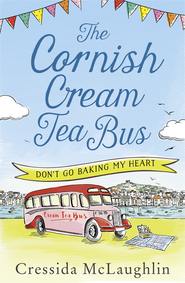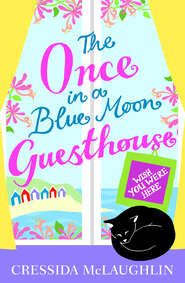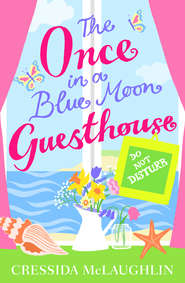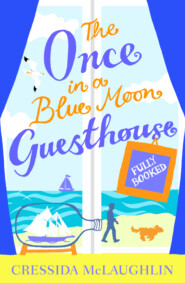По всем вопросам обращайтесь на: info@litportal.ru
(©) 2003-2025.
✖
All Aboard: A perfect feel good romance
Автор
Год написания книги
2019
Настройки чтения
Размер шрифта
Высота строк
Поля
Summer followed Valerie through the doors, and gasped. The café took up the front half of the boat, and was big enough for six two-seater tables. At the back was the counter that served as the throne of Madeleine’s mini-empire. She had sold cakes and scones and coffee, either to those inside, or from the hatch that looked out on to the towpath, treating every customer like a dear friend, the blackboard behind her advertising daily specials. The chairs and tables were painted royal blue with red accents, matching the exterior paintwork of the boat, and even the outdoor furniture, stored on the boat in winter, fitted the colour scheme.
At least, that was the image that Summer had held on to: everything running smoothly, Madeleine so proud of her beautiful café. But now, as Summer stood in the doorway, icy air whispering around the tops of her boots, that shred of reassurance was torn away.
The café was empty of customers, which was a good thing considering the state of it. The tables were in disarray, chairs askew as if people had left in a hurry, and some of the blue paintwork had been scratched, revealing the wood underneath. A bag’s worth of coffee beans was scattered across the floor, collecting in the corners with dust and, Summer noticed, a couple of sizeable spiders. The windows were smeared on the inside as well as out, and some of the bunting had been pulled down. The counter looked like it was dealing with the aftermath of a squirrel-raid, crumbs and plates and mess everywhere, and the smell of burnt coffee caught in her throat.
Valerie shrugged her shoulders, her expression contrite, but Summer knew this was her own fault.
‘It’s not too bad,’ she said tentatively, running her finger along the top of one table. It caught on a splinter.
‘It’s worse,’ Valerie said. ‘I’ve been trying, Summer, I really have. But even during the winter, customers are always … popping in. It’s not always full, but there’s a steady stream and there’s never a minute to recover, and then by the end of the day I’m so shattered.’
‘It’s not your fault,’ Summer whispered. ‘What’s happened here?’ She approached the stricken coffee machine.
‘It’s stopped working. It just belches steam and spray and makes whirring noises, and then, when I was trying to fix it this morning, I knocked the beans over. And what with Jenny,’ she looked away, ‘really pushing the cakes in The Black Swan, I’m not sure that this place, Maddy’s place …’ Her words drifted off and she glanced at the counter, where a few Jammie Dodgers sat under a glass dome with a sign saying ‘Ten pence each’. ‘Maddy’s not happy with me, I know it.’
Summer turned to Valerie, her hands clenching into fists. ‘What?’
‘Her presence is strong. She can see me failing.’ Valerie crouched and picked up some coffee beans, shoving them into the pocket of her dress. ‘She forgives me of course, but even so.’
‘Valerie,’ Summer said, trying to keep her voice even, ‘please let’s focus on getting things back on track. I’m sure it won’t take long.’ She pushed a chair flush against a table, hoping it would make things look instantly brighter. It didn’t.
‘Summer,’ Valerie said, giving her a warm smile, ‘it is sogood to see you. I don’t know why I didn’t call you sooner.’
‘It’s good to see you too,’ Summer said weakly. They both knew that Valerie had phoned Summer before this, but Summer had chosen to ignore her calls, unable to see herself back in the place where her mother – and she – had been so happy. ‘And I’m sorry,’ she added. ‘I’m so sorry Valerie. You shouldn’t have had to look after this place, you’ve got your own life to lead.’
‘But I was Maddy’s best friend. I’m next door. I wouldn’t have been able to forgive myself if I hadn’t at least tried to keep the café going. And I’ve fitted my readings in around it. But I do fear my efforts have made things worse than if it hadn’t been open at all. And the coffee machine was the last straw. If we can’t sell steaming cups of coffee on a February morning, then we’ve got no hope.’
‘So that’s what I’ll look at first.’ Summer shrugged off her coat and hung it over a chair, rolled up the sleeves of her grey jumper and pulled her wavy, strawberry-blonde hair into a messy ponytail with the hairband that lived constantly on her wrist. The stainless steel was hot to the touch, the coffee grinder at the side empty, and when she opened up the bowels of the machine, steam hit her in the face. She turned away, grasping for a cloth, and found a tea towel that looked like it hadn’t been washed in weeks. She wiped her face on her jumper.
Valerie hovered beyond the counter, her long silver earrings dangling. ‘So how’ve you been, Summer? I’ve missed you. Willowbeck’s missed you.’
Summer busied herself with the coffee machine, scooping out chunks of sodden coffee grounds that had been left to pile up, causing the machine to jam. ‘Not too bad, thanks. Work’s busy, we’ve had a few more people join the co-operative, so the studio’s always got a good atmosphere. Christmas was … a bit hard,’ she added, her voice dropping.
‘Oh my love,’ Valerie said, ‘How could it not be, without Maddy there? Are your father and brother keeping well?’
‘They’re fine,’ Summer said. ‘Ben’s still up in Edinburgh, but he came to Dad’s for Christmas. It was strange, though.’ She hadn’t had a full family Christmas since her parents had divorced, nearly eight years before, but the traditional occasions at her dad’s had always been balanced by the time spent with her mum. More often than not they’d celebrated in The Black Swan, but sometimes they’d taken the boat further up the river and discovered other pubs, her mother quickly becoming the centre of attention, happy to talk to everyone, always smiling, and Summer getting swept up in it, finding her own confidence in Madeleine’s presence. Without that, Christmas had felt hollow, her mother’s absence overwhelming.
‘It felt strange here, too,’ Valerie said. ‘Willowbeck seemed much quieter.’
Summer closed her eyes. ‘Of course,’ she said. ‘Of course it was.’
She leant against the counter, dumping handfuls of coffee sludge into the dirty tea towel, and looked at Valerie. Her mum’s best friend had always matched Madeleine for vibrancy, both of them appearing much younger than early fifties, Valerie’s boat Moonshine hosting psychic readings, fortune-telling, astrology charts. A treasure-trove of magic and mysticism that Summer could never quite get her head around.
Somehow, she’d allowed herself to forget that Valerie was as close to her mother as she was. Valerie had lived alongside her for years, had lost her too, and instead of running away like Summer had, she’d tried to carry on where Madeleine no longer could.
It was no wonder that the café had gone downhill, but how much worse would it have been if Valerie had left Summer to deal with it? It would be completely closed, never mind a few scratches and an unappealing selection of cakes.
Summer heard footsteps along the towpath, a couple chatting as they passed the moorings. She sighed and moved the coffee grains around with her fingers. ‘I’m sorry, Valerie,’ she said again.
‘Oh hush,’ Valerie said. ‘You’re here now.’
Summer winced, knowing her apology was inadequate and Valerie was being too forgiving. ‘I think I’ve fixed the coffee machine.’
‘You have?’ Valerie’s eyes widened.
‘It was blocked up. I’ll give it a good clean, and then we can look at some of the other bits.’
‘I’ll get the dustpan and brush.’
‘Have we got any cakes?’ Alongside the Jammie Dodgers was a tray of what looked like flapjack, but was thin enough to be peanut brittle.
Valerie caught Summer’s eye. ‘I’m not much of a baker.’
‘No,’ Summer said. ‘Neither am I. That was always Mum’s thing. So.’ She glanced around her, waiting for a flash of inspiration. She could get some ingredients, fill the café with the smell of baking and entice people in. But what could they do immediately? Even if the seating area needed more work, they had the hatch, which at the moment was closed to the world. Ely and the nearest supermarket was a ten-minute drive away, she’d be back in no time. ‘Is the butcher’s still open at weekends?’
‘Saturday and Sunday mornings,’ Valerie said. ‘Another few hours before they close.’
‘Great. Give me five minutes.’ She washed her hands in the sink, put the sodden tea towel and coffee grounds in a carrier bag and tied it up, and then put her coat on and stepped outside.
The air was biting, sharp and cold compared to the belching coffee machine she’d had her head inside, and the water looked bottomless. She shuddered and stepped on to the towpath, glancing inside The Sandpiper as she passed it, but was met only with darkness. Next was Celeste. It cheered her to think of Norman still in there, even if he was the least sociable person in Willowbeck. He spent most of his time on his deck, fishing, and grumbling when other boats disturbed the calm of the water. For someone who lived on the river, he was particularly intolerant of other boat owners.
She couldn’t believe how quickly everything slipped back into place in her mind: Valerie and her readings, Norman, the butcher’s. The beautiful river, where she’d watched the orange and blue flash of kingfishers, the robin who perched on the tiller or the roof, the cacophony of ducks and geese and swans. It was quiet this morning, the colour of the narrowboats bright against the muted silvery-grey of frosty Willowbeck, but somehow that made it more of a blank canvas for all Summer’s memories.
Except that they all included her mum, laughing or winking at someone, her blonde hair pulled scruffily back, gingham apron on; taking a batch of cherry scones out of the oven; leaning out of the hatch to talk to a passing family, then turning to Summer and telling her a story about when she and Blaze were only knee-high. However many times Summer’s older brother had reminded Mum that he’d legally changed his name to Ben, Madeleine had insisted on referring to him as Blaze, his given name. Summer knew she had got off lightly, but she loved being named after her mum’s favourite season.
Summer found she’d stopped on the towpath, and was tracing the lettering on Norman’s boat with her finger, following the curved lines of Celeste. There was a loud banging from inside, and Summer jumped back as the doors on to the bow deck opened and Norman, looking exactly the same as the last time she’d seen him, navy flat cap, torn green cable-knit jumper and patchy grey beard, appeared and pointed at her.
‘Norman,’ Summer said, breaking into a smile. ‘It’s really good to see you. It’s been a long time, but you look just the same.’
He nodded once. ‘T’off my boat.’
‘What?’ She frowned.
‘Y’ll take the paint off.’ He jutted his chin in her direction, and Summer dropped her hand. Of course, he would know that Valerie had been struggling at the café, even if he hadn’t spoken to anyone. Summer realized that she had a lot to make up for, and not just with Valerie.
‘Sorry, I – I’m sorry, Norman.’
‘Hhm,’ he grunted. ‘Wha’ fer?’
Summer looked at him. ‘For not being here.’
‘Why? S’all the same t’me.’
‘OK,’ Summer said, clearing her throat. ‘Well, I’m going to do bacon rolls from the café this morning. Would you like one?’
‘Hhmmm,’ Norman said, his eyes, shadowed by grey bushy brows, watching her the whole time.
‘Right then,’ Summer said brightly. ‘Have a good day.’ She gave him a quick wave and hurried towards the butcher’s.





